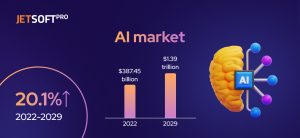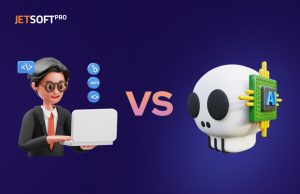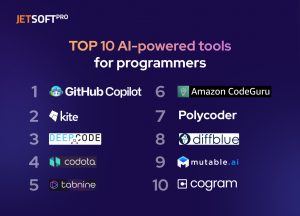Artificial Intelligence (AI) is rapidly changing the landscape of many industries, and software development is no exception.
According to Fortunes Insights, the AI market is projected to experience a compound annual growth rate of 20.1%, expanding from $387.45 billion in 2022 to $1.39 trillion in 2029. It’s particularly remarkable considering the intricacy required to deploy artificial intelligence.

As AI technology continues to advance, it begs the question: Can AI replace developers in the future? This complex question requires a closer look at the current state of AI in software development, its limitations, and the role of developers in the age of AI.
What is the current state of AI in software development?
Today, AI is revolutionizing how programmers work, providing them with new tools and techniques to improve their productivity, code quality, and efficiency. Here are some examples how Artificial Intelligence can help programmers to do their work better:
- Automated Code Generation
One of the most significant benefits of AI in software development is automated code generation. AI can analyze large volumes of data, such as code snippets, syntax, and programming patterns, and generate code snippets based on that data. This technology can help programmers create code faster and more efficiently, reducing the time it takes to write and debug code manually.
- Code Optimization
AI can also help programmers optimize their code by identifying performance bottlenecks and suggesting improvements. AI-powered tools can analyze code and provide recommendations for optimizing it, such as reducing the number of variables or loops in a piece of code. This can help programmers produce faster and more efficient code, improving application performance and reducing resource consumption.
- Bug Detection
Another area where AI is helping programmers is in bug detection. AI-powered tools can analyze code and identify potential bugs, allowing programmers to identify and fix them early in development. This can save significant amounts of time and resources that would otherwise be spent on debugging and testing.
- Predictive Analytics
AI can also help programmers make more informed decisions by providing them with predictive analytics. These tools can analyze data such as customer feedback (for instance, clutch reviews) , usage patterns, and market trends, and provide insights that can inform development decisions. For example, AI can help programmers determine which features to prioritize based on user demand or identify potential issues before they become problems.
- Natural Language Processing
Natural Language Processing (NLP) is another area where AI is helping programmers. NLP can be used to extract insights from unstructured data, such as customer feedback or social media posts. This can help programmers better understand user needs and preferences, informing development decisions and improving the overall user experience.
AI is transforming the way programmers code.
The new era of coding has just begun, but the AI solution cannot fully replace the work of Junior developers. Overall, AI is transforming how programmers code by automating repetitive tasks, providing real-time feedback and suggestions, and improving the quality and efficiency of the coding process. As AI technology continues to advance, we can expect to see even more sophisticated tools and platforms that leverage AI to make programming faster, easier, and more efficient. 
AI is transforming the way programmers code in several ways. Here are some examples:
- AI-powered code completion: Tools like Kite and TabNine use AI algorithms to analyze code and suggest completions for developers. Automating tedious or repetitive coding tasks can save time and reduce errors.
- Automated code generation: Platforms like MutableAI and DeepCode can generate code automatically based on machine learning models or code patterns. This can help developers prototype or scaffold code quickly, freeing up time for more complex programming tasks.
- Code optimization: AI-powered tools like Snyk and Code Climate can analyze code and suggest optimizations to improve performance, security, and maintainability. This can help developers write better code by providing real-time feedback and suggestions for improvement.
- Code review: AI-powered code reviews tools like DeepCode and Cogram can automatically analyze code and identify potential issues such as security vulnerabilities or performance bottlenecks. This can help developers catch errors early in development and ensure that their code meets best practices and industry standards.
- Automated testing: AI-powered testing tools like Diffblue can automatically generate unit tests for code, saving time and ensuring that code is thoroughly tested before deployment.
Have you heard about Copilot? It’s an AI-powered code completion tool developed by OpenAI in collaboration with Microsoft. It uses machine learning algorithms to analyze code snippets and generate suggestions for how to complete them. Copilot, for example, uses the Codex model, a subvariant of the GPT model, to suggest code snippets to the developer as they type. This allows them to work more efficiently, and if the suggested code is unsuitable, they can simply reject it and continue their work.
Copilot works by taking in user input, such as code syntax, function names, and variable names, and generates suggestions for the rest of the code. These suggestions are based on patterns it has learned from analyzing millions of lines of code across many programming languages.
However, it’s important to note that while Copilot can generate code, it’s not meant to replace human developers. Rather, it’s designed to augment and assist them, allowing them to focus on higher-level aspects of programming while reducing the time and effort required for more routine coding tasks.
What AI-powered tools can the market offer to developers in 2023?
As an AI language model, I can recommend the following top 5 AI-based tools for software developers that help to code:

GitHub Copilot: An AI-powered code completion tool that uses machine learning to suggest code snippets based on your input.
Kite: Kite is an AI-powered coding assistant that helps developers write better code faster. It provides intelligent code completions, documentation, and code snippets for Python, JavaScript, TypeScript, HTML, CSS, Go, Java, PHP, C++, and more.
DeepCode: DeepCode is an AI-powered code review tool that analyzes code and provides suggestions to improve its quality. It uses machine learning algorithms to detect potential bugs, security vulnerabilities, and performance issues.
Codota: Codota is an AI-powered autocomplete tool that provides intelligent code suggestions for Java, JavaScript, Python, and other programming languages. It uses machine learning algorithms to understand the context of the code and provide relevant suggestions.
TabNine: TabNine is an AI-powered code completion tool that provides smart suggestions for code completion. It uses machine learning algorithms to understand the context of the code and provide relevant suggestions. It supports multiple programming languages, including Python, JavaScript, TypeScript, HTML, CSS, and more.
CodeGuru: CodeGuru is an AI-powered code review tool that analyzes code and provides recommendations to improve its quality. It uses machine learning algorithms to detect potential performance, security, and code quality issues. CodeGuru supports Java, Python, and more programming languages.
Polycoder: Polycoder is an AI-powered tool that automates the process of translating code between different programming languages. Polycoder uses machine learning algorithms to map code syntax and semantics between languages, allowing developers to convert code from one language to another easily. The tool supports multiple programming languages, including Python, Java, JavaScript, and Ruby.
Diffblue: Diffblue is an AI-powered tool for automated testing. It uses machine learning algorithms to automatically generate unit tests for code, allowing developers to test their code without the need for manual testing thoroughly.
DeepCode: DeepCode is an AI-powered code review tool that analyzes your codebase and provides suggestions for improving code quality, security, and maintainability. DeepCode uses machine learning algorithms to analyze code patterns and identify potential issues before they become problems. The tool integrates with popular IDEs such as Visual Studio Code, GitHub, and GitLab, and supports multiple programming languages, including Java, Python, and JavaScript.
MutableAI: MutableAI is an AI-powered platform that automates the process of building and deploying machine learning models. The platform uses AI algorithms to generate code and optimize hyperparameters, making it easier for developers to build and deploy models quickly. MutableAI also provides a suite of tools for data cleaning, feature engineering, and model evaluation, making it a powerful end-to-end solution for machine learning development.
Cogram: Cogram is an AI-powered code review tool that analyzes code changes in real-time and provides feedback to developers as they write code. Cogram uses machine learning algorithms to detect potential issues such as security vulnerabilities, code smells, and performance bottlenecks. The tool integrates with popular version control systems such as Git and GitHub, and supports multiple programming languages, including Java, Python, and JavaScript.
So, can AI replace developers in nearest future?
It’s unlikely that AI will completely replace software developers in the near future. So, the answer faster will be “no” than “yes.” While AI has made significant advancements in recent years, it still requires human supervision and guidance to perform tasks effectively.
AI is best suited for tasks that involve pattern recognition, data analysis, and other forms of automation. However, software development involves a great deal of creativity, critical thinking, and problem-solving that are difficult for AI to replicate.

Furthermore, software development is a collaborative and social process, involving communication and coordination between team members. AI-powered solutions have the potential to revolutionize the way software is developed, tested, and deployed. From automating routine tasks to improving the accuracy and efficiency of complex processes, AI can offer numerous benefits to software development teams.
Benefits of AI powered solutions implementations for software development
- Improved efficiency: AI can automate many tasks that would otherwise require human intervention, such as code review, bug detection, and testing. This can lead to faster and more efficient software development.
- Better accuracy: AI can analyze large amounts of data and identify patterns that may be missed by human developers, leading to more accurate software design and implementation.
- Enhanced quality: By automating routine tasks and detecting errors early, AI can help developers build higher quality custom technology solutions with fewer bugs and security vulnerabilities.
- Increased productivity: AI-powered tools can help developers work more efficiently by providing recommendations and automating repetitive tasks, freeing up time for more creative work.
However, like any technology, AI has its limitations and potential drawbacks.
Limitation of Ai powered solutions implementations for software development
- Bias: AI algorithms may reflect the biases of their developers or the data they are trained on, leading to unintentional discrimination or other ethical concerns.
- Lack of transparency: Some AI algorithms are complex and difficult to understand, which can make it challenging to troubleshoot problems or explain decisions to stakeholders.
- Limited creativity: While AI can automate many routine tasks, it may not be able to match the creativity and intuition of human developers when it comes to more complex software design challenges.
- High cost: Developing and implementing AI-powered tools can be expensive, requiring specialized expertise and infrastructure. This may make it difficult for smaller development teams or organizations with limited budgets to adopt these technologies.
Developers will still play a crucial role in designing, building, and testing new software, as well as ensuring that the software meets the requirements of the business and the end-users. However, from automated code generation to bug detection and predictive analytics, AI will definitely help programmers work smarter and faster. By leveraging these AI tools, developers in Jetsoftpro can stay ahead of the curve in a rapidly evolving technology landscape.

